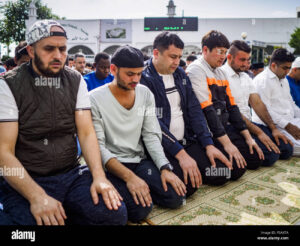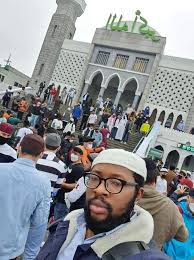Muslims of Korea: History, Civilization and Present Situation
“Explore the history, culture and current situation of Muslims in Korea. Find out how Islam spread in Korea and the challenges facing the Muslim community today.”
Introduction
Korea, known for its rich cultural heritage and technological advancements, has a lesser-known but important connection to Islam. Although the majority of the population follows either Buddhism or Christianity, Islam has slowly gained a foothold in this East Asian nation. This article examines the **history**, **civilization**, and **current situation** of Muslims in Korea, highlighting the journey of Islam from its earliest beginnings to the present day.
The arrival of Islam in Korea
The introduction of Islam to Korea is not as well documented as its arrival in other parts of Asia. However, historical accounts and scholarly research suggest that the first significant interaction with Islam began in the late 19th and early 20th centuries. The spread of Islam in Korea can be attributed to several factors:
1. **Trade and Diplomacy**: During the late Joseon Dynasty (1392–1897), Korea was increasingly interacting with the wider world. The **Silk Road** and sea routes facilitated trade between Korea and the Middle East, bringing Islamic merchants, scholars, and missionaries. Korea’s interest in foreign religions faded, and Islam, like other religions, entered the society.
2. **Immigrants and Labourers**: The early 20th century saw an influx of Muslim laborers from regions such as China and Central Asia. Many of these workers, engaged in construction projects and other manual labor, helped spread Islamic teachings and established small Muslim communities in Korea.
3. **Islamic Missionaries**: During the colonial period (1910-1945), a few Muslim missionaries from neighboring countries, especially Turkey and Central Asia, began to establish a presence in Korea. They established small mosques and Islamic centers, paving the way for the growth of the Korean Muslim community.
Historical Background of Korean Muslims
Korea’s history with Islam can be described as a story of gradual development and quiet assimilation. Although Muslims never formed a large part of the population, their presence exerted a notable influence in certain areas, particularly in cities such as **Seoul** and **Incheon**, where early Muslim communities were established.
1. **First Korean Converts**: While initial contact with Islam was limited, the first recorded conversion to Islam in Korea occurred in the 1950s. The influence of **Muslim laborers** from the Middle East, especially Pakistan and Turkey, played an important role in introducing Islamic ideas to the native Koreans. One of the earliest Koreans to convert to Islam was Ahmad Dad, a Turkish missionary who established the first mosque in Korea in 1955. He is considered an important figure in the spread of Islam in the country.
2. **Development through Education**: As Korea’s interest in Islamic teachings grew, many Koreans traveled abroad to study in countries such as **Saudi Arabia** and **Egypt**. What, which fostered a deeper understanding of Islam. This educational exchange helped the Korean Muslim community develop intellectual and religious foundations.
3. **Challenges and Resilience**: The journey was not always smooth. Muslims in Korea faced prejudice and suspicion, especially during times of political tension in the region. Despite these challenges, Korean Muslims remained strong and openly practiced their faith.
Muslim civilization andCulture in Korea
Although the Muslim community in Korea is relatively small compared to other nations, the cultural contribution they have made to the nation is remarkable. Some aspects of Muslim culture in Korea are:
1. **Religious Institutions**: A number of mosques and Islamic centers have been built in Korea over the years, including **Seoul Central Mosque** (1976) and **Incheon Mosque** (1967). These institutions serve not only as places of worship but also as centers of education, cultural exchange and community building.
2. **Islamic Festivals**: Muslims in Korea celebrate **Eid al-Fitr** and **Eid al-Adha**, these celebrations often include gatherings at mosques, collective prayers and feasts. These events also provide opportunities for non-Muslims to engage with and learn about Islam.
3. **Cultural Contribution**: Although Islam is a minority religion in Korea, Muslim communities have contributed to Korean society in unique ways. Some businesses, particularly halal restaurants and Islamic bookstores, have sprung up in major cities, offering food and products that adhere to Islamic dietary laws. Additionally, traditional **Islamic calligraphy** and **art** have found their place in the cultural fabric of Korea, especially among the younger generation of Muslim converts.
Current situation of Muslims in Korea
According to the latest reports, the Muslim population of Korea is estimated at around **50,000 to 100,000** people, a small fraction of the country’s total population.
Nevertheless, the Muslim community has made significant progress in integrating into Korean society while maintaining its religious identity.
1. **Muslims in Modern Day Korea**: Muslims in Korea come from a variety of ethnic backgrounds, including **Korean**, **Middle Eastern**, and **Southeast Asian**. Korean converts to Islam, especially young people, are becoming more visible in public spaces, contributing to the growth and acceptance of Islam. Muslim communities are active in local and national issues including **interfaith dialogue** and humanitarian efforts.
2. **Challenges facing Korean Muslims**:
– **Islamophobia**: Although the Korean government officially respects religious freedom, some Muslim communities still face prejudice and misunderstandings about their faith. is facing Negative stereotypes of Islam, often fueled by global conflicts, have affected the perception of Muslims in Korea.
– **Legal and Social Rights**: Muslims in Korea continue to advocate for better access to halal food, Islamic education, and recognition of Islamic holidays in schools and workplaces. These efforts continue as they strive for a more inclusive society.
– **Community Support**: Despite the challenges, the Muslim community has thrived through various support networks, such as mosques and Islamic organizations. These centers provide spiritual guidance, educational programs and social welfare services to help integrate Muslims in Korea while preserving their cultural heritage.
3. **Islamic Organizations**: Several Islamic organizations, such as **Korean Muslim Federation** and **Korea Islamic Society**, play an important role in supporting the Muslim population. These organizations work to raise awareness about Islam, promote interfaith dialogue and provide assistance to those in need.
Future Prospects for Muslims in Korea
Looking ahead, the future for Muslims in Korea looks promising but not without its challenges. As global and local dynamics evolve, Korean Muslims will continue to face the task of promoting understanding and integration while maintaining their distinct religious identity.
1. **Interfaith Dialogue**: Efforts to promote peaceful coexistence and understanding between Muslims and non-Muslims will be important. Increased dialogue between religious communities can help remove misunderstandings about Islam and promote mutual respect.
2. **Islamic Education**: One of the main goals for the future is to expand Islamic education in Korea. Establishing more Islamic schools and offering religious education in mainstream schools will help raise future generations of Muslims who are well-versed in Islamic and Korean traditions.
3. **Growing Influence**: With increasing numbers of Koreans converting to Islam and younger generations becoming more involved in the community, Islam in Korea has the potential to become an important part of the country’s multicultural landscape. .
The result
The story of Muslims in Korea is one of resilience, adaptation and integration. From its humble beginnings in the late 19th century to its current status, Islam has proven its ability to survive and flourish in Korea. Despite challenges such as Islamophobia and limited resources, the Muslim community continues to grow and contribute to Korean society, culturally and socially. With continued efforts toward education, interfaith dialogue, and mutual respect, the future of Muslims in Korea looks bright, marking their place as an integral part of the country’s diverse landscape.